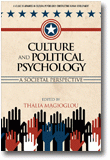
Culture and Political Psychology
A Societal Perspective
By:
Thalia Magioglou, EPoPS, FMSH/Centre Edgar Morin, EHESS, France
A volume in the series: Advances in Cultural Psychology: Constructing Human Development. Editor(s): Jaan Valsiner, Niels Bohr Professor of Cultural Psychology, Aalborg University.
Published 2014
This book is perhaps the first systematic treatment of politics from the perspective of cultural psychology. Politics is a complex that psychology usually fails to understand— as it assumes a position in society that attempts to be free of politics itself. Politics is associated both with an everyday practice, and the dynamics of globalization; with the way group conflicts, ideologies, social representations and identities, are lived and co-constructed by social actors. The authors of the book address these issues through their research grounded in different parts of the world, on democracy and political order, the social representation of power, gender studies, the use of metaphors and symbolic power in political discourse, social identities and methodological questions. The book will be used by social and political psychologists but is also of interest to the other social sciences: political scientists, sociologists, anthropologists, educationalists, and it is at a level where sophisticated lay public would be able to appreciate its coverage. Its use in upperlevel college teaching is possible, and expected at graduate/postgraduate levels.
CONTENTS
Preface Understanding Political Processes: A New Arena for Cultural Psychology. Introduction Societal Political Psychology in Paris, Thalia Magioglou. Acknowledgments. Part I: Introduction, Thalia Magioglou. Democracy as an Open-Ended Question: A Model of Lay Thinking Grounded in Two Cultural Contexts, Thalia Magioglou. Culture, Tools, and Subjectivity: The (Re)Construction of Self, Helen Haste. Othering in Political Lay Thinking: A Social Representational Approach to Social Order, Christian Staerklé. Concluding Remark Differently Inside: Political Psychology and Lay Thinking, Luca Tateo. Part II: Introduction, Thalia Magioglou. A Missing Triad: The Politics of Location, Hierarchy, and Negotiation of Knowledges, João Manuel de Oliveira and Lígia Amâncio. Women’s Understanding of Modernity in Indonesia: The Search for a Cultural Platform, Risa Permanadeli. Japanese, Oriental, or Western? The Conceived Classification of Rhetoric, Debate, and Communication as Academic Subjects in the Japanese Educational System, Pia Moberg. Concluding Remark Reflecting on Intersubjective Approaches to Power and Knowledge in Cultural Political Psychology, Catarina Kinnvall. Part III: Introduction: Politics as Symbolic Power, Thalia Magioglou. Prime Minister’s Wife, Minister’s Disease, and Mummy Government: How Culture Affects Metaphors Used in Japanese Political Discourse, Ofer Feldman. The Study of Politics From the Perspective of Social Representations Theory, Maria Geka. Concluding Remark Politics as Symbolic Power, Thalia Magioglou. Power as an Object of Transcultural Studies in Societal Psychology, Lucy Baugnet and Arnauld Fouquet. Popular Culture and Political Psychology: Lessons From Asia, Nissim Kadosh Otmazgin. Concluding Remark Symbols as Power: Their Efficacy as Instruments and Indicators of Social Change, Ragini Sen. Part IV: Introduction: Methodological Issues at the Crossroads of Different Social Sciences, Thalia Magioglou. Psychological Constraints of Social Psychology and Its Actors: Political Consequences? Ralph Balez. Movies as Method: Film Analysis and Reception Studies for Societal Political Psychology, Diana Gonzalez. Social Identities, Societal Change, and Mental Borders: Identity Construction Strategies of Young Slovaks Commuting Between Bratislava and Vienna, Barbara Lášticová and Magda Petrjánošová. Concluding Remark Beyond the Politics of Method: Toward an Intersubjective Approach, Brady Wagoner. Part V: Conflict in Education, Thalia Magioglou. Multicultural Dimensions and Minority Status in Education: A Social Psychological Approach, Margarita Sánchez-Mazas. A Minority Education Reform in Western Thrace, Greece: Psychosocial and Political Perspectives, Thalia Dragonas. Educational Intervention Strategies in Vulnerable Populations: An Experience That Invites a Community to Dream, Géraldine Kerneur Brücher. Concluding Remark Culture and Politics in Education, Maritza Montero. Conclusion Globalization(s) for Societal Political Psychology: Worlds Where Meanings Are Negotiated and (Re)Constructed Through Power Relations, Thalia Magioglou. About the Contributors.
-
Paperback9781623963675
Web price: $62.04 (Reg. 72.99)
-
Hardcover9781623963682
Web price: $89.24 (Reg. 104.99)
- eBook9781623963699

- PSY000000 - PSYCHOLOGY: General
- PSY031000 - PSYCHOLOGY: Social Psychology
- PSY030000 - PSYCHOLOGY: Research & Methodology
-
 Culture, Work and Psychology
Invitations to Dialogue
Culture, Work and Psychology
Invitations to Dialogue
-
 Deep Loyalties
Values in Military Lives
Deep Loyalties
Values in Military Lives
-
 Drama of Multilingualism
Literature Review and Liberation
Drama of Multilingualism
Literature Review and Liberation
-
 From Dream to Action
Imagination and (Im)Possible Futures
From Dream to Action
Imagination and (Im)Possible Futures
-
 Home in Transition
The Cultural Construction of Heimat
Home in Transition
The Cultural Construction of Heimat
-
 Making of Distinctions
Towards a Social Science of Inclusive Oppositions
Making of Distinctions
Towards a Social Science of Inclusive Oppositions
-
 Ornamented Lives
Ornamented Lives

